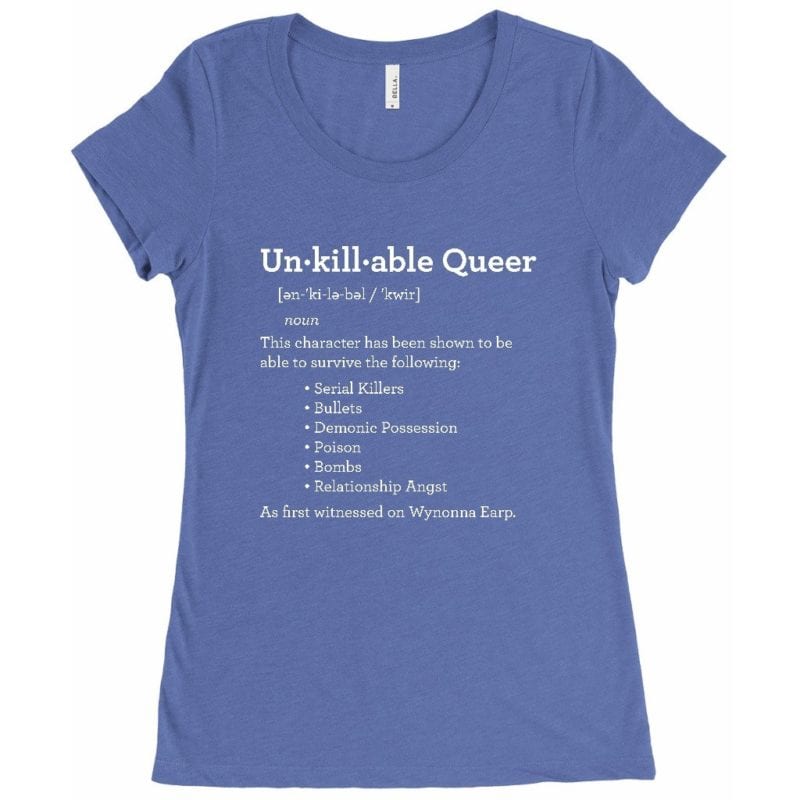Under the guiding hands of Emily Andras, the team of writers who gave us Wynonna Earp have done the impossible. They created the Unkillable Queer. And not just one character falls into this trope, one was not enough. No, they gave us three (one could legitimately argue four) queer characters who survived this season. And on a show that regularly deals in guns, explosions, and demonic creatures with a well-stocked arsenal of deadly abilities, it’s impressive. Especially since other showrunners in recent years seemed to think that telling a story with queer characters meant they could not help but kill them off.
What is the Unkillable Queer? Up until recently, they were only a myth, the creation of weary LGBT+ fans tired of seeing their favorites killed off at astonishingly high rates. One such legend became dubbed the “Bulletproof Lesbian”, and it was a cry for better representation and better storytelling.
Little did we realize that Emily Andras and her writing team had taken that cry to heart and was about to give us the most blatant ‘eff you’ to the Bury Your Gays trope (BYG) I’ve ever seen in a single season of television. Without further ado, I give you Emily Andras’ Unkillable Queer. (For simplicity’s sake, I will use “Andras” as a shorthand for “Andras and the writing team, for, as both head writer and showrunner/producer, she has final say in the direction the storytelling goes.)
Nicole Haught
Nicole’s run as an Unkillable Queer began in season 1 of Wynonna Earp, long before Andras would have been able to be making a statement on the state of queer female representation. I interviewed Kat Barrell, who plays Nicole on the show, and she admitted neither she nor Andras were aware of the impact Nicole’s survival would have on the queer female community. Yet Andras’ choices stand out all the more for coming from a place of honest storytelling. She wasn’t trying to make a statement, just tell a good story. And to her a good story meant not killing off woman loving woman (wlw) characters for Drama™.
At the end of season 1, Willa Earp shot Officer Nicole Haught point blank…and Nicole survived. She was wearing a bulletproof vest, you see, as all police officers ought to wear, and yet it still came as a surprise. With the death of Lexa on The 100 so recently in people’s memory, a wlw character shot in the stomach, in front of her girlfriend, but not dying seemed to invalidate every argument made for why Lexa had to die and in the manner she did.
What’s more, Nicole’s survival in no way undermined the dramatic tension of the scene. That one second before Nicole gasped for breath, when Waverly thought her girlfriend was dead, my heart plummeted. That she survived and cracked a joke about why a police officer wouldn’t be wearing a bullet proof vest generated more emotional investment in the form of relief and trust (more on this later).
Nor did Nicole’s survival undercut character growth or plot tension. In fact, Nicole’s survival created more narrative momentum for Waverly than her death would have. Waverly not only had an added reason to hate Willa (she already had plenty), she also had a reason to stay controlled and clear-headed about taking her sister and Bobo out. While the death of a loved one is a stock way to ‘level up’ a character, it’s also so overused at this point as to become cheap. Reacting to the survival of a near death experience is much more interesting from a character perspective because it’s less explored. Characters with something, and someone, to live for have greater psychological interest due to the internal struggle between recompense and honoring their living love interest.
Thus, in that one scene Andras proved how unnecessary killing of wlw characters was with regard to plot, character development, and dramatic interest. But she did even more than that in the first season by choosing not to make Waverly or Nicole casualties of either of the serial killers.
I consider 1×04 “The Blade” to be a low point in the Wynonna Earp franchise; a serial killer out to kill women for being promiscuous, even if the true goal turns out to be slightly different, is lazy. However, the one high point of that episode was that neither of the wlw characters (even though Waverly wasn’t ‘out’ yet) were targeted. Yet even when Nicole was attacked by Jack the Ripper the Jack of Knives and left for dead, she recovers. Given how much wlw characters can be singled out for punishment, suffering, and torture, Nicole surviving an attack from a serial killer who specifically targets female victims stands out.
Yet all of this is a mere shadow of the lengths Andras went to truly instantiate Nicole Haught as the quintessential Unkillable Queer in season 2. Having survived being shot in season 1 and now aware of the Bury Your Gays trope, you’d think Andras would go out of her way to avoid any kind of threat for her canonical wlw characters. Other shows have gone in that direction since spring 2016. You’d be wrong.
Instead, Andras found a way to generate both tangible narrative threats but without actually killing her characters.
It all begins when Waverly—under the influence of demon possession (more on her later)—seems poised to cut Nicole’s head off in 2×01. Waverly’s eyes go black (the mark of her possession), she raises an axe, declares “this is for the greater good”, the axe falls…and commercial break. Holy crap, did Waverly just kill her girlfriend?? Nope. After the break, we come back to discover she’d only cut the head off of a demon corpse so she could use it for their plan to break into Black Badge. Whew! Andras, you troll!

But she wasn’t done. In 2×10, one of the demonic Clootie Widows attacks and bites Nicole, poisoning her. The deadly poison will kill her if they don’t find an antidote, and everyone drops quite literally everything to save her, at great personal cost. The entire episode revolves around every character pitching in to help save Nicole, a wlw character. Against all odds, she survives. Two times over even, because if Waverly hadn’t have traded Doc’s ring for the antidote from the Widow Beth, Wynonna would have saved her with the antidote she, Jeremy, Dolls, and Rosita cooked up.
But Andras still wasn’t done. In 2×11, Waverly, Nicole, and Jeremy (all canonically queer characters), detonate a bomb inside of the barn on the Homestead to bring Wynonna back from a cursed alternate reality. Due to magic, they all survive. And this is in an episode where pretty much all the canonically straight protagonists—Doc, Dolls, Nedley—died. They were brought back next episode of course, like the three in the barn, because magic, but still. The only three characters to survive and save everyone else were the three canonically non-straight protagonists. Biggest. Middle. Finger. To. BYG. Ever.
So far, Nicole has survived being shot, blown up, and poisoned as well as avoiding being the casualty of multiple serial killers who specifically targeted women at some point. That’s pretty Unkillable.
Waverly Earp
Waverly avoided being targeted by the serial killers at all in season 1. She also survived being shot in the stomach (it was more of a graze), leading to her adorable confession of her queerness to Wynonna when she asks if chicks dig scars. Though we recently discovered she’s not a full Earp, that didn’t prevent her from having to face demons on practically a daily basis in the first season. Any number of these attacks could have killed her, if the writers had wished it. Yet she survived the first season physically intact, if emotionally compromised due to Willa’s betrayal and the revelation that she might not be an Earp after all.
Her tenure as a protagonist, though, was in question when season 2 began. Demon possession will do that. There were huge questions about her going ‘dark’ or ‘full demon’, especially when it looked like she might be Bobo’s half-revenant offspring. She was in a perfect position to have a Dark and Gritty™ arc, a revenge arc, or even just do things that would change her character from the hopeful, smart, joyful character she’d always been in the first season.
Andras veered hard left and gave us not only a demon-free Waverly, but one who never fully lost herself no matter what choices she made under the demon’s influence. She may be a suffering empath, but she’s never singled out for punishment just because she’s a good person.
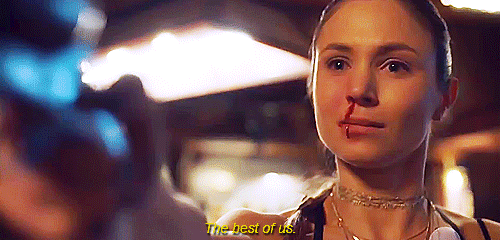
More than anything, Waverly’s demon possession seemed poised to undermine the emotional and romantic beats of the WayHaught relationship. I recall many of my friends questioning how much of what Waverly and Nicole did together sexually was under the demon’s influence. That the core of WayHaught could be compromised due to Waverly’s possession seemed entirely possible based on the scripting of certain scenes—a problematic story for a wlw relationship from any angle.
Yet once again, Andras proved that her queers can survive not just physical harm but, as she so memorably called it in a live Reddit chat, “sexy, sexy drama.” The show took great pains to call out any misreading of Waverly’s actions under demonic influence. She and Nicole have a direct conversation about it in 2×06, and Waverly admits that nothing that happened between them occurred while she was possessed. I feel compelled to point out that Andras could have left this ambiguous. Some writers would probably argue that the ambiguity created more ‘tension’ and leave it as is and screw the implications. Not Andras. Not even problematic relationship implications can destroy these queer ladies and their love!
There were several other places where Andras could have generated or sustained relationship drama long past its sell by date. Nicole’s work ambitions clashing with Waverly’s desire to protect her from Black Badge, for example. Or Nicole’s secret marriage. Or Waverly kissing Rosita. Any or all of these situations could have either sunk the WayHaught ship or been sustained as long, drawn out conflicts to generate Drama™.
Instead, they’re all eventually resolved via communication, honesty, and apologies where necessary. Nicole and Waverly behave like adults and talk things through when they have the space to do so. Waverly’s very strong reaction to Nicole hiding the truth about her DNA results didn’t really jive with me, nor did Nicole hiding it in the first place. That episode overall seemed poorly paced and oddly out of character compared to the rest of the season, but even that issue between Nicole and Waverly was resolved in a timely manner. Plus, this episode was followed up with by Everyone Saves Nicole and the Soulmates AU, so I can’t really complain.
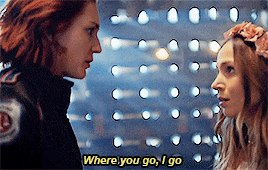
Let’s not forget that Waverly also survives the same bomb blast as Nicole. She also survives both getting a large rock thrown at her and Wynonna by Bobo and Rosita physically attacking her in the finale. All that to say, Nicole and Waverly prove that queer women can survive all kinds of physical danger and emotional drama in their relationship without either undermining the tension involved or getting anyone killed or permanently compromised.
Jeremy Chetri
Oh Jeremy. My favorite nerdy gay. He has a big ol’ fat crush on Doc (and Dolls), and is entirely unabashed about it by the end of the season. As more of a tertiary character, he faces fewer direct threats to his person this season. Yet that, to me, makes his survival all the more remarkable, as tertiary queer characters are far more likely to be killed off for cheap Shock and Awe™. They’re considered by many other showrunners to be disposable.
Add to it that Jeremy is played by a person of color, and is the nerd of the group, and his survival to the end of the season stands out even more. If any one character were the most ‘throw away’ by standard measures of survival rates on mainstream tv shows, it would be Jeremy Chetri.
Again, Andras gives a giant middle finger to that logic. Jeremy and Waverly survive a demon attack in the first episode, and, alongside Doc, he survives getting paralyzed by the Black Widows (twice actually, the second time along with Nicole in the finale). Alongside Nicole and Waverly, he’s one of the ones who survives the deadliest episode of the season to save everyone from the alternate universe by blowing himself up. And he survives that as well. The finale seemed poised to torture and/or maim Jeremy when Bobo threatened to use the metal in his body against him. Jeremy shoots Bobo with his plastic ray gun instead (I love Jeremy so much).
Despite being the least trained and least physically fit to fight demons, Jeremy holds his own and survives. His crushes on Doc and Dolls are never made into a joke or held against him. Neither are ever even uncomfortable about it, just uninterested. Need I tell you just how easy it would be to make the nerdy, gay man of color the brunt of endless jokes and harassment? Andras nopes on out of that without even a passing glance.
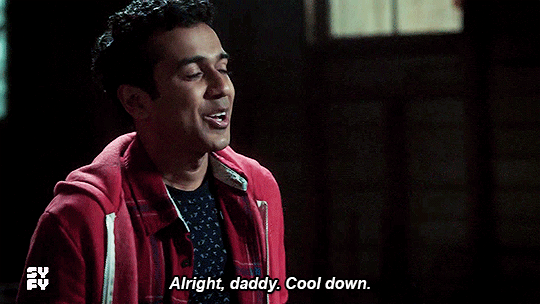
Moreover, Jeremy dropped some pretty fascinating hints about maybe being psychic in the finale, so we know he’s not going to be written off the show any time soon. He’s here, he’s queer, and he’s here to stay. I couldn’t be happier.
Rosita Bustillos
Rosita’s a hard character to pin specifically as queer, but I’m going to talk about her anyway. After all, Rosita never said she wasn’t interested in girls after Waverly kissed her; she only said that she was with Doc and Waverly with Nicole, so nothing could happen. Moreover, she confesses in the finale that “she really liked [Waverly].” Your mileage may vary on what precisely that means, be it platonic or romantic, but I think reading a romantic undertone there is not out of place.
Plus, Tamara Duarte, who plays Rosita, is going to be at ClexaCon next year so….yeah. Take that for what it’s worth. I choose to believe it means Rosita is bi.
As an aside, I have to mention my one hesitation with the Rosita x Waverly kiss scene more generally is the way that it could be seen as playing into the Cheating Bisexual trope. I don’t think it was intended that way, and Nicole’s secret marriage to Shae adds a layer of complexity to WayHaught that isn’t easily defined by “Waverly is a cheater, therefore she’s bad.” Context is everything, and in this case, I don’t think it qualifies as intentionally playing into the trope. But still. I would have appreciated not having the only two female characters who could be described as bi kissing each other while both being in a relationship with other people.
Anyway, back to Rosita. While she does not survive to detonate the bomb with Jeremy, Nicole, and Waverly, it’s worth nothing that she’s one of the final four. She’s also the only revenant to survive the attempt to steal Wynonna’s baby. In fact, one of my biggest questions at the end of the finale stemmed from the fact that Peacemaker grazed her instead of killing her.
The show established the fact that Peacemaker doesn’t miss casually. Yes, Wynonna accidentally shot her father instead of the demons when she was a child because she wasn’t the heir. And yes, Waverly was wielding the gun while not being the heir. At the same time, Peacemaker didn’t just miss, it glowed a different color.
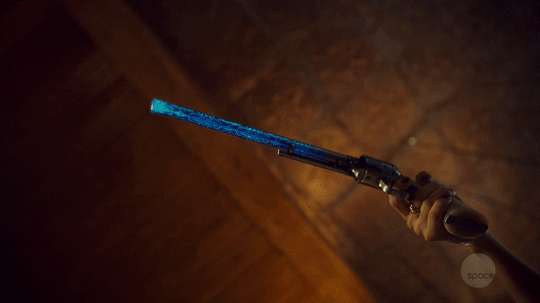
That tells me something completely different is happening. Tim Rozon (who plays Doc) theorizes that this means Peacemaker was actively seeking an alternate solution to killing Rosita.
“Blue is Peacemaker’s way of telling Wynonna there is a better way of dealing with this enemy. Red means she needs to send them to hell.”—(source)
Recall that Peacemaker also turned blue when Wynonna shot Willa at the end of last season. Now the theory is still up in the air, but it’s something to think about. How much of Rosita surviving is due to Peacemaker having a mind of its own, and how much has to do with the feelings of the shooter? Blue might mean that neither Wynonna nor Waverly truly wanted to shoot their target (Willa and Rosita), Peacemaker did glow orange when Wynonna threatened Rosita in 2×10, after all.
Either way, the result is Rosita surviving, and hopefully returning next season. When a bisexual demonic revenant played by a woman of color survives until the end of the season after trying to steal the protagonist’s baby? You know you have an Unkillable Queer on your hands.
Why It Matters
The point I’m trying to make in all this is that killing off queer characters isn’t necessary. There are ways to write dramatic tension that don’t involve death, and Emily Andras just proved that in spades with the most recent season of Wynonna Earp. Death, maiming, torture, and suffering as default for Dramatic Satisfaction™ and Shock and Awe™ just isn’t going to cut it anymore.
Neither is flat, overly saccharine, stakes-less storytelling that ditches true dramatic tension for predictability seemingly to avoid pissing off queer audiences. I don’t know about you, but the idea that I have to be treated like I could ‘go off’ at any second because queer characters face any kind of threat feels pandering and condescending. We deserve better than that, too.
In the end, it’s about building trust with your audience. Once Andras proved that she’s not out to kill us, we can trust her to handle WayHaught with the delicacy it deserves. We don’t have to worry that Waverly will kill Nicole, or that Nicole’s secret marriage will completely destroy their relationship. Having proven that she cares about the community and representing our characters well, audiences can lean into the tension of the narrative without fear that it means death, suffering, or a breakup.
Wynonna Earp proves this middle road can be walked. Queer female audiences now know that they don’t just have to hope for better than infantilizing or destructive stories, they can actually get better stories. We can get well-paced, well-written sexy, sexy drama that honors character growth, plot, and themes. We can see our faves and their romantic relationship survive anything and everything the plot throws at them. We can get Unkillable Queers.
—
If you are as stoked about the idea of an Unkillable Queer as I am, check out the shirt we designed to commemorate this groundbreaking season of television. I know I’m getting one asap.
